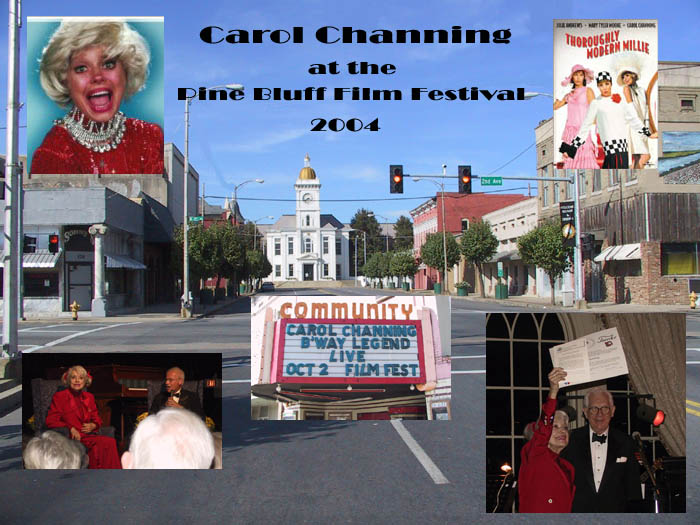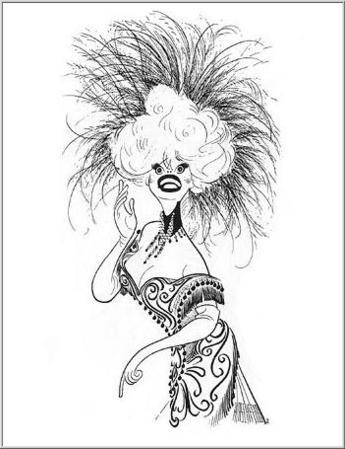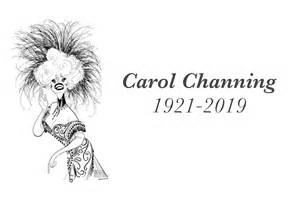With the passing this week of a legend of the theater stage, Carol Channing, at the age of 97, a unique entertainer has left this world. Here is my interview with her in 2004 that I originally posted on my Travels & Stories website.
Carol Channing at the Pine Bluff Film Festival

Look who was the guest star at the 11th Annual Pine Bluff Film Festival last fall – yes, believe it or not, my hometown of Pine Bluff, Arkansas, has an annual film festival. The legendary star of Broadway musical comedy, Carol Channing, attended the festival held on October 1-2, 2004. Since 1994, the organizers of the festival have put together a laudable event that celebrates a selection of films from the earlier days of Hollywood. Past guest stars have included Douglas Fairbanks, Jr., Geraldine Chaplin, Melissa Keaton Cox, Van Johnson, Fay Wray, Ruth Warrick, Tippi Hedren, Gloria DeHaven, Celeste Holm, Jane Russell, and Kitty Carlisle Hart.
The main event of the 2004 festival began at the Pine Bluff Country Club with Carol attending the dinner and dance honoring her with her husband Harry Kullijian. Guests in attendance then commuted across town for a viewing of one of Carol’s few silver screen performances, Thoroughly Modern Millie with Julie Andrews and Mary Tyler Moore in 1967. Carol received an Academy Award nomination for Best Supporting Actress for her performance as Muzzy. Following the screening, Carol arrived for an interview with Foster Hirsch. She even entertained the audience with her singing and dancing.
The film festival originated through the efforts of Kathy Majewska, a Pine Bluff native who has an extensive background in the performing arts. An accomplished dancer, singer, and musician, Kathy is an adjunct professor of ballet and modern dance at the University of Arkansas at Little Rock and the executive director of the Old Town Theatre Centre in Pine Bluff. Her professional training includes graduating from the University of Oklahoma ballet program and studying in New York at the American Ballet Theater and the Martha Graham Center of Contemporary Dance. She went on to perform with several international dance companies, including the Cameron Highland Dancers which she founded and which performed at the United Nations.
In 1994, Kathy and a few of her friends started the film festival in an effort to raise money to restore the Saeger Theatre in downtown Pine Bluff that had been closed and deteriorating for twenty years. The early years of the event focused on celebrating some of the classic silent films and presented with full orchestral accompaniment provided by the Pine Bluff Symphony Orchestra. The festival has now evolved into a two-day event presenting a selection of classic films, both silent and sound, at the nearby Community Theater, a smaller theater whose renovation was completed. Kathy also invited two of her friends from New York, John Beatty and Foster Hirsch, both professors at Brooklyn College of City University of New York to moderate the scheduled programs during the event. Mr. Beatty is a professor of anthropology and linguistics as well as having been an actor on the New York stage. He has been the master of ceremonies and lecturer at the festival since its inception. Mr. Hirsch is a professor of film and has authored several books on the subject. He has been lecturer and interviewer of the guest star since its inception.
During her interview, Carol covered several of the topics that you can read about in her autobiography, Just Lucky I Guess: A Memoir of Sorts that she published in 2003.
Some highlights of her autobiography:
Her early years growing up in San Francisco, including the story of her first love Harry Kullijian, with whom she recently reconnected with and subsequently married after a seventy-year separation.
Her years as a struggling actress in New York before breaking through with her debut in 1948 in No For An Answer. This performance led to her other early performances, including Lend An Ear. She reached international fame when she starred as Lorelei Lee in Gentlemen Prefer Blondes which premiered on December 8, 1949. She includes an amusing anecdote about Marilyn Monroe’s visits to the show as she prepared for her performance in the same role in the 1953 movie version.
She includes stories about her interacting with her fellow entertainers and encounters with several statesmen and dignitaries. George Burns, Noel Coward, and Mary Martin, for instance, were dear friends of hers. She includes a humorous story about Marlena Dietrich, Lucile Ball, and Desi Arnez’s reaction to her Marlena impersonation. She includes stories about her several visits to the White House and the people she would meet when traveling abroad.
She includes a considerable discussion about her experience as the first Dolly Levi in Hello, Dolly! – the role for which she won the Tony Award in 1964. She discusses how she got the part, the preparations for opening night on January 16, 1964, the anticipation by the Broadway critics. Her love for the role. She mentions that at one of her shows in February 1964, Jacqueline Kennedy, Caroline, and John Jr., made their first public appearance after JFK’s assassination.
She talks about a method that was key to her live performances: instead of focusing on the whole audience, she would focus on communicating her performance to a friend or relative in the audience, a person she loved and trusted and who wanted her to do well. She tells an interesting story about how she translated that method to film a medium in which there was no immediate response from a live audience. While filming Thoroughly Modern Millie, she was close with Julie Andrews so she directed her performance to her.
Interview with Carol Channing – October 2, 2004
Joe Pascale: I read your book.
Carol Channing: Oh, you read it? That book is so disorganized. It’s just terrible.
JP: But it’s fun. When I was reading your book, it was like you were talking to me.
CC: Yes?
JP: Have you finished the book on tape yet? You said in another interview that you were working on that.
CC: I made a tape and don’t know what to do with it. I need a distributor.
JP: Really? It’s not the publisher of the book?
CC: Simon & Shuster. No. They are not in that business, they say, anymore. They’re just not in it. They said, “Would that you could make a tape of it because it is not a book.” The editing department corrected everything amusing about it.
JP: They probably wanted you to follow their formula. I hear that they sometimes miss material that is fresh and engaging because it doesn’t follow a preconceived formula.
CC: Yeah. To me, if you show who you are as a person and your feelings and nobody else’s — the closer you get to you — that is what’s fascinating. But maybe we’re wrong. Maybe people just want the facts.
JP: I’m sure there probably is an audience that wants only that —
CC: Oh. They’re mathematicians then. They’re lawyers.
JP: — but not everybody thinks like that.
CC: It got good reviews and sold well when it came out.
JP: Well, your story is an important account of theater history.
CC: The only thing is that Simon & Shuster hands you over to the editorial department, and apparently the man there never heard of me.
JP: What? Was he under 30 years old or something?
CC: Oh. That’s it. He said, “This is too ego-centric. Very self-centered.”
JP: Good grief. It’s an autobiography.
CC: I said, “It’s funny, you fool!” He had no sense of humor whatsoever. None.
JP: However, it’s encouraging, don’t you think, to see when young entertainers reach back to learning what earlier generations of entertainers like you did and how you all influenced entertainment styles today?
CC: Yes, they see the progress of it. I just worked with LL Cool J [at the 2004 Tony Awards]. I thought he was great.
JP: How did that happen?
CC: The Tony Awards people said, “Would you like to be on the Tony Awards?” The next thing I knew was that LL Cool J wanted me to work with him.
JP: How much time did you have to rehearse?
CC: Fifteen minutes. That’s all. But I was born rapping. I was back in my native habitat. We all have hereditary traits and I’m proud of my heredity. Very proud. And that’s why I put it in the book because I thought everybody else would be proud of me. But boy, there’s a reaction.
JP: As you mention in your book, your successful career was not without its struggles and setbacks, was it? Before you made your big break, many things happened that could have made you decide to quit but you didn’t. It seemed like your love of the theater pushed you through.
CC: Oh yeah. I grew up going to the theater in San Francisco with my allowance. I treasured every performance I saw. I’ve noticed that people who have something to give appreciate other talents in their own direction. A great performance thrilled me. It made me so happy to be in the same business. It just re-inspired me. That’s what happens to you if you’re giving honestly of yourself to the audience and you really fall in love with the character you are playing.
JP: Do you think that is what helped you with your career and success – re-inventing that inspiration?
CC: What really helped me, like I wrote in the book, is playing it to somebody who understands you completely.
JP: Like your friend Noel Coward.
CC: Noel Coward was one. It works. If it doesn’t work, you find out who your friends are. The key thing is to tell it to someone who really loves you. That somebody who just can’t wait to hear this plot. Notice where they sit in the theater. Tell it to them. You’re relaxed with them. You know they want to hear this story. It takes on power. Before you know it, everybody understands this character as well as I do and as well as my father does. They can tell why I wanted to play this character so badly. It grows like two sticks rubbed together and it takes fire. Before you know it, there’s my father over there. There are my friends back there. Then there’s another somebody who absolutely understands what you’re trying to tell them about this character, what the character is going through. Then it goes to the mezzanine, and then the first balcony, the second balcony, and there it is. That’s how to keep it fresh. I did way over 5,000 performances over a span of 30 years and I never tired of her.
JP: You discuss in your book opening night of Hello Dolly! Most of the people in front rows were Broadway critics. You realized that while they obviously were not there to be your friends and support you, they were still involved in this entertainment process with you.
CC: They were frightened. They knew they wanted to get their reviews right. We were working together. It was my job to let them see how monumental this character is. Let them know how wonderfully this whole thing is written. Thornton Wilder wrote the original The Matchmaker.
JP: How’s your one-woman show coming along? Do you think you’ll take it to Broadway?
CC: I don’t know. Every fading actress has a one-woman show now. But I’m thrilled with it. I never did myself before. To get perspective on yourself is tricky. It’s what you wish you were or what you hope the impression you give is. You see these shows where the actress is asked, “Can you describe yourself?” She responds, “Well, I’m very interested in culture. I love museums.” My reaction is “What – who is this person she’s talking about?” And they go on. It’s what they wish they were or they don’t have time to be real. But if you can get to that nitty gritty — and you don’t get to it by yourself. You get to it through somebody who loves you. Your father. Your mother. Somebody who wants you to tell all your hereditary them. There’s something about it that’s healing too. I wasn’t giving of myself. I was giving what I saw in Thornton Wilder’s character of Dolly Gallagher or whatever character. I played some ten shows on Broadway and nine characters in London. And every one of them came out of adoration and loving that person.
JP: You said that you could not get the character of Dolly in you until you sang and danced the numbers in the show.
CC: Yes, to sing and dance the character gave me her soul. To just walk and talk her character gave me the outer shell of her. But I didn’t get into that upper echelon of her spiritual soul.
JP: Now as you do that, you cover the score of several songs in the show. Is it a particular song or lyric, for example with Lorelei Lee in Gentlemen Prefer Blondes, is there something in Diamonds Are A Girl’s Best Friend or A Little Girl From Little Rock that helps you find her character or is it the overall nature of all her songs that helps you?
CC: It’s the overall. She doesn’t know it, but she’s a child. That’s what Europeans thought of us. That we’re naïve, childish, childlike, and gangsters all at the same time. And uneducated in comparison to Europeans.
JP: I get that from some Europeans. That we’re violent cowboys.
CC: Some of it is jealousy. What makes Lorelei palatable, loveable is her innocence. She’s brought virginity to every man she likes.
JP: But making her likeable to the audience was not easy considering the materialistic side of her. So you had to find something about her that was appealing to the audience.
CC: Yeah. She’s totally unaware of it having been anything except helpful to anybody.
JP: How did you adjust your stage performances to television and film particularly when you didn’t have an audience in front of your.
CC: In a way, it happens as quickly as when you answer a telephone. You don’t yell at them. It’s right there. It’s right there on your mouth. So you say, “Hello.” But you don’t say, “DOLLY, DON’T YOU EVER GO AWAY ….” You don’t do that to a telephone. It’s that immediate. I’m standing right by your ear. I don’t have to do that. But if you’re way up in the fourth balcony, I better project it. It’s as simple as that. In Oklahoma City, there were 7,500 people. All I could do was hurl every word and hope they heard it and hoped they saw it. I just kept throwing it way up there, but that’s automatic.
JP: My first memories of you were seeing your appearances on some of the television shows of the late sixties and early seventies. It always looked liked a big fun cocktail party where everyone was having a great time.
CC: Do you know that every piece of creative work that you present on TV, on the stage, at the movies, on radio, wherever, you go through a period where it’s the worst idea anybody ever thought of. It’s death. Forget it. It’s just wrong. And you suffer over it because you love the idea so much and you want to do it and express the reason you started to do it and it’s all going down the drain. If you can live through that — it’s hell. It’s real hell because it’s an aborted childbirth. But then, you say it’s not going to be aborted and you stick together and you keep working on it and it starts to come together again. But you have to go through that hell. They all go through hell before they can act like they’re having such fun. You’ve got to go through it. Nothing is easy. It’s not fun. Some people say, “Have fun!” If I’m having fun, you can bet nobody else is.


